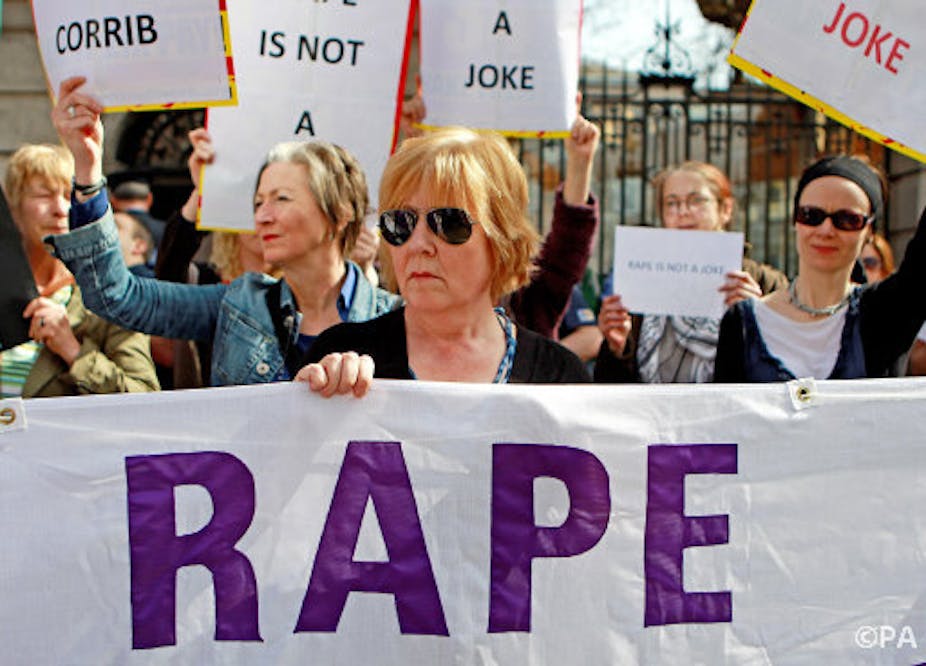Rolf Harris’s conviction on 12 charges of indecent assault came at the end of a long trial. The case put sexual assault victims in the spotlight once again – only the latest high-profile example of a growing public focus on violence against women, sexual assault and rape.
The media has enthusiastically picked up on and followed stories involving the online harassment of prominent women such as Caroline Criado-Perez, the feminist campaigner who was subject to death and rape threats on Twitter after campaigning for women to be included on English banknotes.
Meanwhile, the Everyday Sexism project, which highlights the sexism and harassment women face on a daily basis, has over 150,000 followers on Twitter and a significant media following. With the introduction of Clare’s Law, which allows people to find out if their partner has a history of domestic violence, there has also been a renewed focus on the issue of women as victims of domestic violence.
These efforts should be celebrated for recognising the very real violence and harassment that are all too routine for women. But there is also the possibility that such a focus on victimisation is also reinforcing a pernicious stereotype that still dogs the prosecution of sexual assault and rape cases: the “ideal victim”.
Virtuous and weak
The Norwegian criminologist Nils Christie defined the ideal or “perfect” victim as “a person or category of individuals who … most readily are given the complete and legitimate status of being a victim”. They are typically seen as virtuous, weak in relation to the offender, and blameless for whatever happened to them (the most ideal, he hypothesised, being a middle-aged woman visiting her ill mother).
When women in particular do not meet this standard, their status as “real” and “deserving” victims is undermined; they are imperfect victims. This happens throughout the criminal justice system to a variety of victims, but it is particularly active in cases of abuse and sexual and domestic violence.
For example, in order for battered women to truly be viewed as the victims of their abusive partners within criminal legal discourse, they must conform to the battered victim stereotype of being faithful partners, devoted mothers if they have children, and meek and passive in the face of violence. If they fail, they are not truly victims; they are instead “undeserving viragos”.
Similarly, to qualify for “true” victimhood, women raped by strangers must not have engaged in “risk-taking behaviour” such as walking home alone at night, wearing revealing clothing, being intoxicated, or doing anything that could be perceived as “sexualised”.
My prerogative
This loaded application of the “victim” label denies women the prerogative to exercise their agency; that is the ability to choose their actions and behaviours. In fact, it imagines agency and victimhood as by definition incompatible.
As Martha Mahoney put it, “In our society, agency and victimisation are each known by the absence of the other: you are an agent if you are not a victim, and you are a victim if you are in no way an agent.” So if a woman who has experienced domestic or sexual violence has also exercised her agency by asserting herself in a way that could incur some kind of blame for her victimisation, her status as a victim is uncertain.
A woman raped after making the active choice to walk home alone at night in what is perceived as “revealing” clothing is seen as an imperfect victim. Similarly, a battered woman who is having an extra-marital affair and attempts to fight back against her husband’s violence does not fit the picture, and we question if she really counts as a victim.
A clearer acknowledgement of the agency of victimised women within criminal legal discourse would arguably ameliorate this situation, as when these women do exercise their agency it will no longer be viewed as undermining their status as an ideal victim. This would also help to abolish the construction of the ideal victim, allowing an acknowledgment that those currently viewed as “imperfect” victims have too been victimised and deserve to have this recognised. Simultaneously, as a society, rather than focusing on women as victims of their circumstances, of men and of a patriarchal society, we need to think of women as agents, empowering themselves, fighting back against victimisation, and attempting to change their circumstances in whatever way they can.
That would mean all women who have been victimised, regardless of what decisions they made, could expect violations of their bodily rights to be rightly acknowledged – rather than dismissed when they fail to match an insidious and damaging stereotype.

